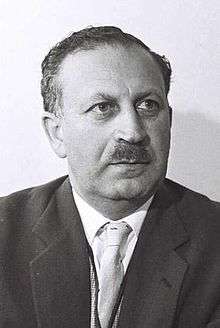Ya'akov Meridor
| Ya'akov Meridor | |
|---|---|
 | |
| Date of birth | 29 September 1913 |
| Place of birth | Lipno, Poland |
| Year of aliyah | 1932 |
| Date of death | 30 June 1995 (aged 81) |
| Knessets | 1, 2, 3, 4, 5, 6, 10 |
| Faction represented in Knesset | |
| 1949–1965 | Herut |
| 1965–1974 | Gahal |
| 1974–1984 | Likud |
| Ministerial roles | |
| 1981–1984 | Minister of Economics & Inter-Ministry Co-ordination |
Ya'akov Meridor (Hebrew: יעקב מרידור, born Yaakov Viniarsky on 29 September 1913, died 30 June 1995) was an Israeli politician, Irgun commander, and businessman.
Biography
Meridor was born in Poland in 1913, as Yaakov Viniarsky, to a family of middle-class merchants. After hearing reports of the first Arab rebellion in Mandatory Palestine, he became a member of the Betar Movement in 1930. He studied law at the University of Warsaw.
He immigrated to Palestine in 1932, and joined the Irgun a year later. In 1941 he accompanied David Raziel on a mission to Iraq in order to sabotage oil fields on the outskirts of Baghdad. When Raziel was killed along with a British officer, Meridor returned to Palestine and took over as Chief Commander of the Irgun.
In 1943, Meridor relinquished command of the Irgun to Menachem Begin, but held senior positions in the Irgun until the Haganah handed him over to the British in 1945. He was sent to various detention camps in Africa, and carried out daring escape attempts, finally succeeding in 1948 and arriving in Israel on the day independence was declared.
According to The Scotsman, the Irgun announced in Tel Aviv on 7 April 1948 that 'Jacob Meridor' had "taken over his war assignment" in Palestine. The Scotsman also reported that Meridor's first command was the raid on Pardes Hana military camp, South of Haifa, in which 6 British soldiers and their commanding officer, Lieut-Colonel G.L. Hilderbrand, were killed.[1]
Post-independence
Under Begin he was charged with the task of managing the Irgun's integration in the newly formed Israel Defense Forces.
In the political sphere Meridor was one of the founders of Herut and was elected to the Knesset in Israel's first elections. He also co-founded a company that imported canned meat, but which ran into trouble due to austerity regulations in force at the time, and the Israeli government ended up buying the company. He retained his seat in elections in 1951, 1955, 1959, 1961 and again in 1965 after Herut had merged with the Liberal Party to form Gahal (which later became Likud). He also published a book in 1955, entitled Long is the Path to Freedom: Chronicles of one of the Exiles. However, he lost his seat in the 1969 elections.
In 1960, while still in the Knesset, Meridor set up the deep-sea fishing company "Atlantic" jointly with businessman Mila Brenner. In 1962, they set up the shipping company "Maritime Fruit" for transporting frozen cargo around the world. The company grew rapidly, and at its height, operated 42 ships, and also extended its operations to oil shipping and the construction of tankers. As a result of his business activities, Meridor became wealthy. In his book Terror out of Zion, J. Bowyer Bell noted:
"One of the greatest transformations has been that of Meridor, who was first elected to the Knesset with the occupation of worker, but who has since become Israel's greatest shipping tycoon, a rival to the Greeks, a man whose photograph has been in Time, who appears more often in Monaco than along Dizengoff Street."[2]
The company experienced severe liquidity problems due to the decline in oil shipping during the 1973 oil crisis. It ceased to exist in 1977.
Meridor resurrected his political career in 1981 when he was elected to the Knesset on Likud's list. He was appointed Minister of Economics and Inter-Ministry Coordination by Prime Minister Begin. He retained his ministerial position when Yitzhak Shamir took over from Begin in 1983.
Despite his high rank within the government, Meridor lost his seat again in the 1984 elections, and did not return to the Knesset.
He and his wife Ziporah are buried in the Nahalat Yitzhak Cemetery in Givatayim.
References
- MERIP Middle East Report, No. 142, Wealth and Power in the Middle East (Sep. – Oct., 1986), pp. 36–38
External links
- Ya'akov Meridor on the Knesset website
- Yaakov Meridor Irgun
|